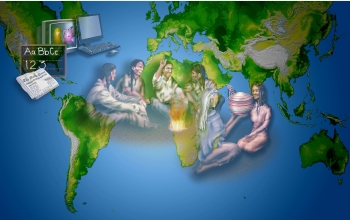|

Media Advisory 05-011
Documenting Endangered Languages

June 7, 2005
Linguistics experts estimate that almost half of the world's 6,000-7,000 existing languages--and the cultural, linguistic and cognitive information they encapsulate--are headed for oblivion. In response, the National Science Foundation (NSF), in partnership with the National Endowment for the Humanities (NEH), has launched a multi-year "rescue mission" to document and preserve key languages before they become extinct. More than 70 at-risk languages will be digitally archived as part of their new Documenting Endangered Languages (DEL) awards program.
Reporters are invited to attend a briefing on June 14 to explore the DEL program and to highlight three current research projects that underscore its value and goals.
What: Briefing - "Documenting Endangered Languages"
Who: David Lightfoot, NSF assistant director of Social, Behavioral and Economic Sciences
Carole Watson, NEH assistant chairman for Partnerships and National Affairs
Joan Maling, NSF program director of linguistics
Seth Kramer, Ironbound Films, Inc.
Susan Penfield, University of Arizona
Lise Dobrin, University of Virginia
When: Tuesday, June 14, 2005, 1:30 - 2:30 p.m.
Where: National Science Foundation
4201 Wilson Blvd., Room 110
Arlington, Va. 22230
(Ballston Metro stop)
- Enter at corner of 9th & Stuart
- Go directly to Rm. 110 on the left (no need to check in with security)
For directions: http://www.nsf.gov/about/visit/
To listen and ask questions via speaker phone: Dial Toll Free No. 1-877-716-1362 Passcode: 697899
RSVP (media only) to nmahoney@nsf.gov
For more information and a detailed agenda, contact:
Media: Nicole Mahoney (nmahoney@nsf.gov)
Others: Susan Mason (smason@nsf.gov)
-NSF-

Media Contacts
Susan M. Mason, NSF (703) 292-7748 smason@nsf.gov
Nicole Mahoney, NSF (703) 292-5321 nmahoney@nsf.gov

The National Science Foundation (NSF) is an independent federal agency that
supports fundamental research and education across all fields of science and
engineering, with an annual budget of $6.06 billion. NSF funds reach all 50
states through grants to over 1,900 universities and institutions. Each year,
NSF receives about 45,000 competitive requests for funding, and makes over
11,500 new funding awards. NSF also awards over $400 million in
professional and service contracts yearly.
 Get News Updates by Email Get News Updates by Email
Useful NSF Web Sites:
NSF Home Page: http://www.nsf.gov
NSF News: http://www.nsf.gov/news/
For the News Media: http://www.nsf.gov/news/newsroom.jsp
Science and Engineering Statistics: http://www.nsf.gov/statistics/
Awards Searches: http://www.nsf.gov/awardsearch/
| 

